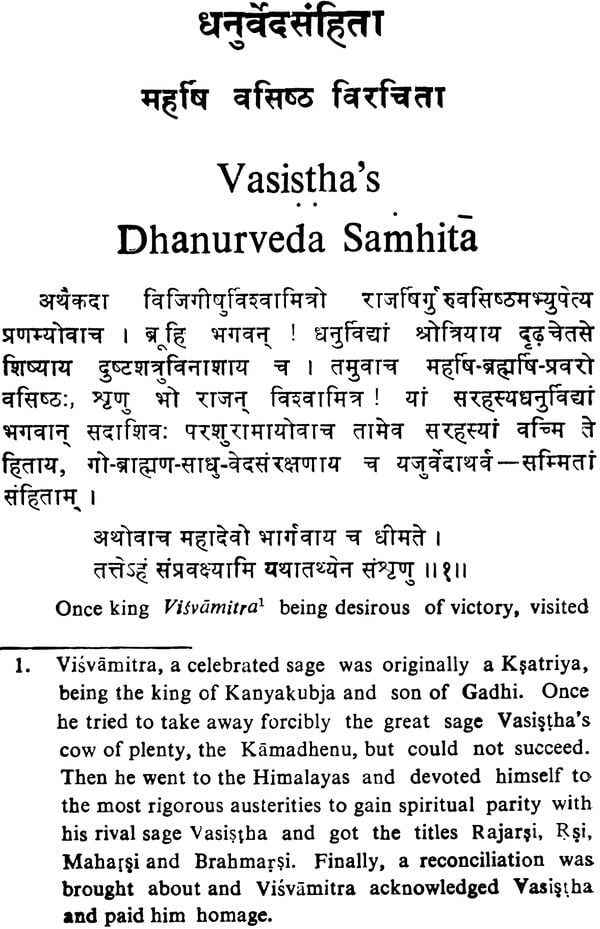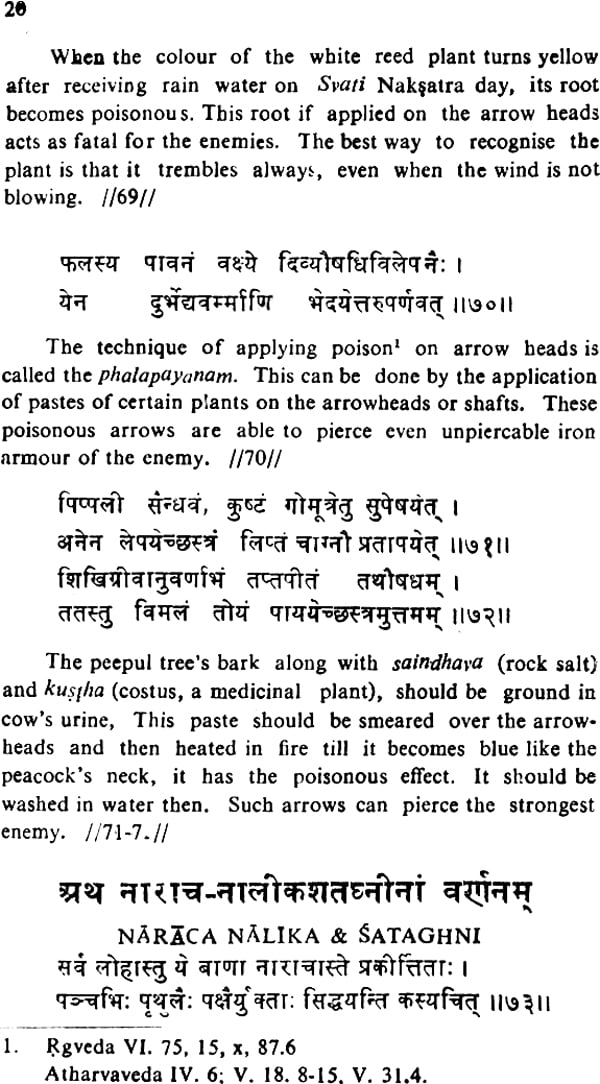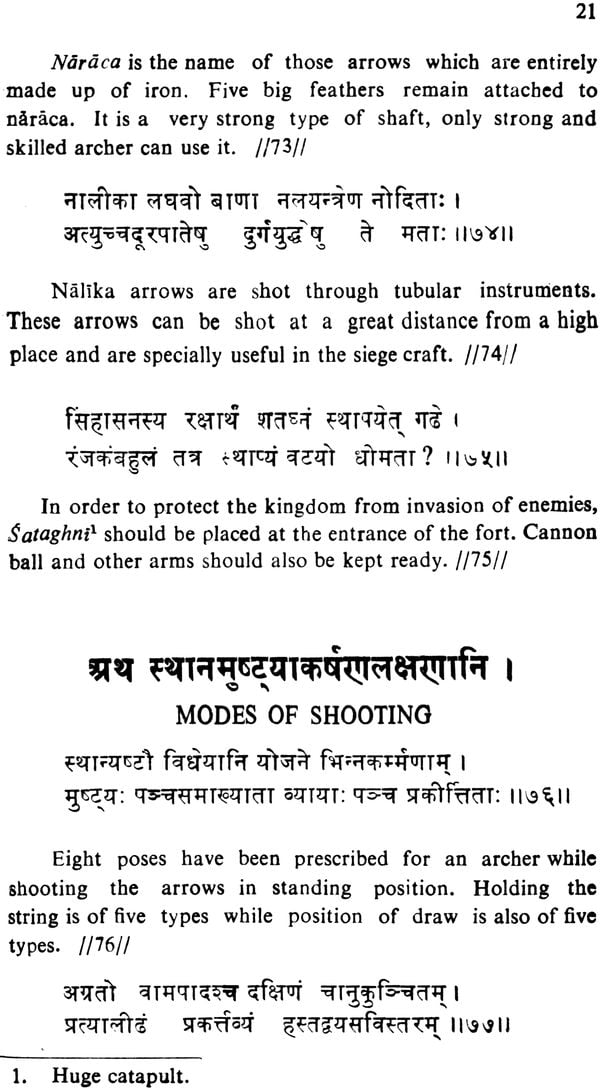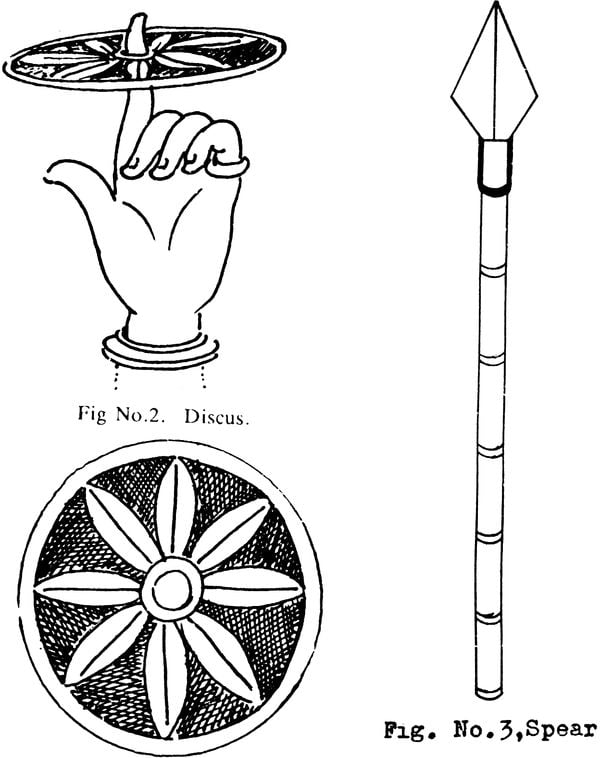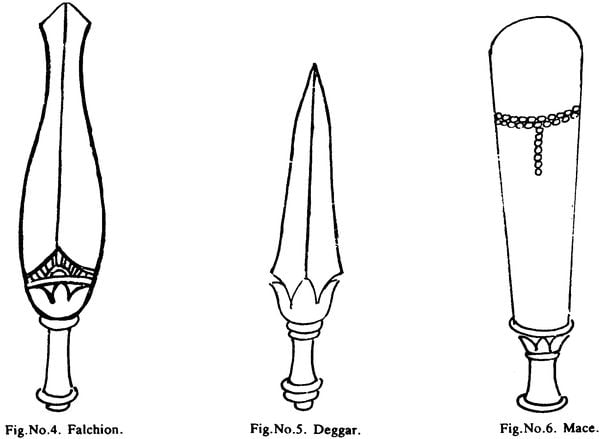
Vasistha's Dhanurveda Samhita
Book Specification
| Item Code: | NAK403 |
| Author: | Purnima Ray |
| Publisher: | J.P. Publishing House |
| Language: | Sanskrit Text With English Translation |
| Edition: | 2014 |
| ISBN: | 9788186702895 |
| Pages: | 88 (18 B/W Illustrations) |
| Cover: | Hardcover |
| Other Details | 8.5 inch X 5.5 inch |
| Weight | 250 gm |
Book Description
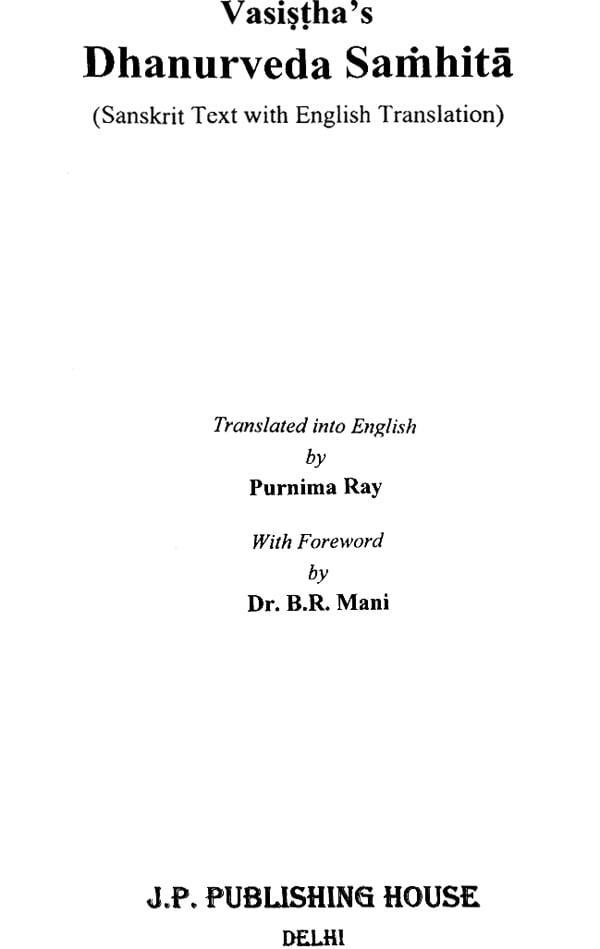
The present treatise Vasistha’s Dhanurveda Samhita is a faithful rendering of the original composition of sage Vasistha who had it transmitted through a tradition of sages being traced back to gods Siva and Brahma and described in the Sukraniti as upaveda of the Yajurveda. The entire tradition permeates provocative material with different levels of interests and interpretations. Previously, largely unfamiliar to modern scholarship the subjects delineated here were compulsorily taught to such who wanted to acquire excellence in the skill. This meant laying down of thorough instructions and formularies by other sages like Parasurama, Visvamitra, Vaisampayana and Ausanas whose texts have been recovered in manuscript form from libraries of Tirupati, Nepal Darbar, Asiatic society, Bombay, Deccan College Research Institute, Pune and Oriental library of Baroda.
It is a richly textured work which has brought forth meticulously researched data for assessing the tradition of craftsmanship and a basic weaponry of war which cardinally affected the fabric of human society. The work provides interesting and scientific reading in regard to both physical and mystical implecations ranging from craftsmanship of the weaponry including measurements and qualities of bows and arrows, methods of teaching, shooting techniques to the use of medicines and charms and general war practices.
I appreciate Mrs. Ray’s attempt to revise interest in the ancillary sciences of the past through this evocative work on archerly, which is rare, indeed, and has been made accessible to scholars after much genuine and wakeful efforts of her. The translation is precisely lucid and connotative of intense lexicology.
The existence of Dhanurveda or Science of Archery can be traced back to ancient time as is evident from references in several ancient literatures. Visnu Purana refers it as one of the eighteen branches of knowledge taught by Bhrgu, while the Mahabharata mentions it as having sutras like other Vedas. Sukraniti describes it as that ‘upaveda of yajurveda’ which has five arts or practical aspects- use and employment of arms by the proper arrangement of legs, duelling by the various artifices, throwing arms towards the aim formation of battle arrays according to the signals, arrangement of horses, elephants, chariots, etc. Agnipurana and Samrajya-Lakshmi-Pithika, a Saiva Tantra contain separate chapters on Science of archery and describe in detail the correct posture in shooting, position of drawing the bows, measurements of bows, etc. According to Visnudharmottara, god Satakrata (Indra) represents Dhanurveda or the knowledge of warfare. Another representative of Dhanurveda in a personified form and his worship as god is found in the book ‘History of Punjab’ by Syad Muhammad Latif (originally published in 1889). Here the deity who rides on a bull posses four feet, eight arms and three eyes. His weapons are bow, sword, thunderbolt, discus, sataghni, club, spear, battle axe.
The present translation work is based on the book Vasistha’s Dhanurveda Samhita (Bengali ed.) by Pandit Iswar Chandra Sastri and Arun Chandra Sinha. The book was published in 1922 from Mymensingh, now in Bangladesh.
In the introduction of his book, Sastri referred Brahma as an introducer of Dhanurveda and about Lord Mahadeva who preached the Science of Archery to Parasurama. He also had mentioned the names of great sages Visvamitra and Vaisampayana as authors of several treatises on Dhanurveda, Unlike the Puranas, Vasistha associated Dhanurveda with both Yajurveda and Atharvaveda.
Besides providing the account of the training of the archers, Vasistha’s Dhanurveda describes different types of bows and arrows, process of making them, different steps in practice teaching. Adoption of tantric ways for wining the battle, worship of different gods for victory, application of herbs, charms as preventive measures in war, formation of arrays, duties of kings and army commanders, training of the elephants, horses have also been dealt with.
Dhanurveda Samhita of Vasistha, according to Sri P.C. Chakravarti can not be dated before 17th century A.D. as it mentions “Chatrapati”, the title which came into vogue only during Maratha hero Shivaji’s time (AD 1630-1680).
It has got a number of verses identical with Samrajya Lakshmi Pithika and Brhat-Sarngadhara Paddhati. Which testifies the presence of one common and earlier source. This is probably Siva Dhanurveda which Vasistha’s Dhanurveda had quoted often.
The Sanskrit version and the illustrations given in this book have been reproduced from the original, The terms and words have been explained in the footnote wherever possible and necessary. Inspite of my best efforts, errors might have crept in and I stand responsible for all these omissions.
| Methods of Teaching Archery. | 5 |
| Characteristics of Teacher | 5 |
| Shooting Technique | 9 |
| Measurements of a bow | 10 |
| Characteristics of a good bow. | 11 |
| Prohibited bow. | 12 |
| Qualities of good string | 15 |
| Qualities of arrow | 16 |
| Arrow Heads-Types | 18 |
| Application of the arrow-heads | 18 |
| Applying poison over arrow-head | 19 |
| Naraca Nalika and Sataghni | 20 |
| Modes of Shooting | 21 |
| Holding the String | 23 |
| Drawing the bow | 24 |
| Position of draw | 25 |
| The aim | 26 |
| Target Practice | 28 |
| Cessation from Study | 30 |
| Shooting | 31 |
| Perfect Shooting | 34 |
| Fast shooting | 35 |
| Long range shooting | 35 |
| Rules for piercing strong object | 35 |
| Movement of arrows | 36 |
| Direction and speed | 37 |
| Right speed | 38 |
| Shooting strong objects | 38 |
| Aiming at pictures, points | 40 |
| Piercing wood | 40 |
| Aiming while moving | 41 |
| Method of Aiming | 41 |
| Aiming through hearing | 42 |
| Returning Arrow | 43 |
| Weapons | 45 |
| (Purification of weapons) | 47 |
| Pasupatastra | 48 |
| Use of Medicines, Charms in archery | 51 |
| Upavasa Method | 54 |
| War Strategy | 54 |
| Meditation and praying | 55 |
| War Strategy based on the principle of Astrology | 61 |
| Battle array | 63 |
| Military Arrey | 66 |
| Staff array | 67 |
| Car array | 67 |
| Ant array | 68 |
| Training of army | 69 |
| Infantry | 69 |
| Training of the horses | 72 |
| Training of the elephants | 72 |
| Chariots | 73 |
| Selection of Commander-in-chief | 73 |
| Training and education | 74 |
| Persons not to be killed | 74 |
| List of weapons | 76 |
| Illustrations | 81 |
